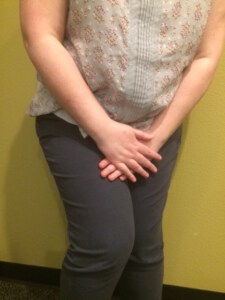 It goes something like this. You are holding your newborn baby. It starts with a sneeze. And you think, did I just pee my pants? With a certain amount of shock, you realize, it’s true. You did just wet your pants.
It goes something like this. You are holding your newborn baby. It starts with a sneeze. And you think, did I just pee my pants? With a certain amount of shock, you realize, it’s true. You did just wet your pants.
This inconvenient and at times, embarrassing, little problem is urinary incontinence. It is not a rare problem. Lots of women — regardless of age — are secretly dealing with it. According to the Agency for Healthcare Research and Quality, more than 13 million Americans have incontinence, and women are twice as likely to have it as men. The rates of urinary incontinence increase with age: 20-30% of young women, 30-40% of middle-aged women, and up to 50% of older women suffer from urinary incontinence.
There are different types of Urinary Incontinence often based on cause.
-
Stress incontinence
is that little leak that can happen when you sneeze, cough, or laugh hard. It actually can happen from any motion that stresses or puts too much pressure on the bladder. Common causes of stress incontinence are pregnancy and childbirth, when pelvic muscles and tissues can get stretched and damaged. It can also occur from high-impact sports, as a result of aging, or from being overweight.
-
Urgency incontinence
also called “overactive bladder,” is a bit different. It’s the urgent need to go, followed by an involuntary loss of urine. There can be anything from a few seconds to a minute’s warning. It is thought to be due to spasms of the bladder muscles. Triggers for women include drinking a small amount of water, touching water, hearing running water, or being in a cold environment. Anxiety or certain liquids, medications, or medical conditions can make urgency incontinence worse. Conditions such as multiple sclerosis, Parkinson’s disease, or a urinary tract infection can be the cause of urgency incontinence.
-
Mixed incontinence
means you have more than one type of incontinence, with stress and urgency incontinence being the typical mix.
-
Overflow incontinence
is described as not being able to empty your bladder every time you go to the bathroom. As a result, you experience a frequent or constant dribbling of urine. Certain medications can cause this problem, and people with nerve damage from diabetes or men with prostate issues can also experience this type of incontinence. It is due to impaired bladder muscle contractions or bladder obstructions.
-
Functional incontinence
occurs when physical disability, external obstacles, or problems in thinking or communicating keep a person from reaching a toilet in time. For example, a woman with Alzheimer’s disease may not plan ahead for a timely trip to a toilet. A woman in a wheelchair may have difficulty getting to a toilet in time. Arthritis—pain and swelling of the joints—can make it hard for a woman to walk to the toilet quickly or unbutton her pants in time.
How is urinary incontinence in women treated by allopathic medicine?
Treatment depends on the type of UI. Health care professionals may recommend any of the following:
- Behavioral and lifestyle changes. Women with UI may be able to reduce leaks by making behavioral and lifestyle changes.
- Stopping Smoking. Smoking increases a person’s chances of developing stress incontinence, as it increases coughing
- Bladder training. Bladder training is changing urination habits to decrease incidents of UI.
- Pelvic floor muscle exercises. Pelvic floor muscle, or Kegel, exercises involve strengthening pelvic floor muscles. Strong pelvic floor muscles more effectively hold in urine than weak muscles.
Acupuncture helps urinary incontinence
Chinese medicine theory believes incontinence to be a deficiency of energy, or qi. As “gates,” the bladder sphincter needs significant energy to function properly. Urinary incontinence is thought to stem from issues with kidney energy, so acupuncture treatments may focus on increasing kidney qi. Points along the bladder meridian may also be stimulated to help control urine flow. The spleen is thought to influence transportation and transformation fluids and foods, and is also responsible for developing the body’s muscles. So points along the spleen channel may be used.
There may not be direct scientific evidence that eating, diet, and nutrition to either improve or worsen. UI. However, many people find that dairy, alcohol, tomatoes, spices, chocolate, caffeinated and citrus beverages, and high-acid foods may contribute to bladder irritation and inflammation, which can sometimes lead to UI. Moreover, good eating, diet, and nutrition are directly related to preventing factors that increase the chances of developing UI, such as obesity and diabetes.
Our results
We have found significant improvements very quickly with acupuncture treatments. As the kidney qi responds to treatment, the muscles are more in sync with the nervous system and the brain and thus leakage is lessened dramatically, if not stopped completely.
Ready for treatment?
Call 503-246-0103 to schedule an appointment.
Have a question?
To submit an inquiry to one of our professionals, email us at contact@riverwestacupuncture.com.Have a question about acupuncture or some of our other services? Send us your question and we’ll get back to you shortly with a reply!
